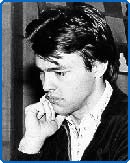Intro
There are few persons, even among the calmest thinkers, who have not occasionally been startled into a vague yet thrilling half-credence in the supernatural, by coincidences of so seemingly marvellous a character that, as mere coincidences, the intellect has been unable to receive them.
Edgar Allen Poe
Arthur Koestler
Coincidence may be described as the chance encounter of two unrelated causal chains which--miraculously, it seems--merge into a significant event. It provides the neatest paradigm of the bisociation of previously separate contexts, engineered by fate. Coincidences are puns of destiny. In the pun, two strings of thought are tangled into one acoustic knot; in the coincidental happening, two strings of events are knitted together by invisible hands.
Arthur Koestler
It is appropriate that this survey of man´s ideas about the universe should end with Newton for... our vision of the world is by and large still Newtonian... Until a new maestro emerges... the blueprint of the universe remains essentially the one that Newton drew for us, in spite of all disturbing rumours about the curvature of space, the relativity of time and the runaway nebulae. There, after the long voyage from the Babylonian star gods, the Greek crystal spheres, the medieval walled universe, our imagination has come to rest.
The Sleepwalkers by Arthur Koestler
Today we regard his alchemical and theological speculations as aberrations of genius - like Kepler´s Harmony of the World. But it is worth making the imaginative effort to grasp that both Newton and Kepler regarded these works as the crowning achievements of a lifetime devoted to ´justifying the ways of God to man´. Both of them would have been shocked by the modern view that science is merely an attempt to understand the physical universe.
Starseekers by Colin Wilson.
Despite the stature and achievements of men like Jung and Pauli, very few scientists would dare to admit anything remotely resembling the theory of synchronicity into their everyday calculations, not only from fear of ridicule by their scientific colleagues but also because such an admission threatens - or seems to threaten - the very basis of a rationalist science. Yet, while science dares not contemplate any theory as anarchic as synchronicity, it cannot entirely suppress an uneasy sense of something big and mysterious lurking on the threshold of consciousness...
Alternative Science by Richard Milton
It is impossible to review this enormous book as a whole, but it is worth considering some recurring themes. One is the way in which people have been motivated by a quest for spiritual understanding. In many different ways we see how psychical research and parapsychology have sprung from a belief in dualism, a search for the afterlife, or an honest desire to make a science of man´s spiritual nature. In all these quests parapsychology has sadly failed, and this book clearly shows how.
But Alcock is almost alone in respecting the quest, even while criticizing its results so far.
One day we may well have a spiritual science and come far closer to understanding human nature than we are today, and skeptics could lead the way rather than scoffing at the ideal!
Susan Blackmore, reviewing A Skeptic´s Handbook of Parapsychology in the Fall 1986 issue of The Skeptical Inquirer.
But Alcock is almost alone in respecting the quest, even while criticizing its results so far.
One day we may well have a spiritual science and come far closer to understanding human nature than we are today, and skeptics could lead the way rather than scoffing at the ideal!
Susan Blackmore, reviewing A Skeptic´s Handbook of Parapsychology in the Fall 1986 issue of The Skeptical Inquirer.
Martin Gardner wrote that "by an emotional leap of faith" he believed in a Deity "utterly inscrutable to our little finite minds".
And he also said,
"I believe there to be truths as far above my understanding as calculus is beyond that of a cat."
Now read on... !




Comments